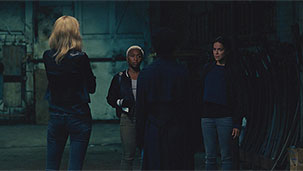There are many positive things to say about Widows; It boasts stellar performances by its ensemble cast, is well-scripted and well-paced, and is generally a pretty solid exploration of how and why men are the fucking worst. The narrative sometimes feels precariously close to the edge of trying to do too much, but manages to make its points quickly and effectively, which is just as well, because there is a lot going on.
Widows is unapologetically political in its confrontation of issues surrounding gender, race, and class, and is impressively intersectional in its take on privilege. The central conflict is over money and power, but the narrative goes a lot further in showing us how each character arrives at this point of conflict, what motivates them, and how they relate to each other, based on their own backgrounds and experiences.
There was one scene that stood out to me which deserves a spotlight for the way it takes the question of privilege and, with a very clever rigging of the camera, distills them into a brief, simple visual that perfectly depicts the disparities between the film’s characters.
During Jack Mulligan’s campaign for a local alderman’s seat, he speaks before a crowd in a neighbourhood where the label ’at risk’ would be an overstatement. Jack, in full White Saviour mode, promises jobs and renewal, trying to win over his audience of mostly female, black, working class voters while avoiding uncomfortable questions from a reporter covering the event, before hurrying into a waiting car with his campaign manager. They drive back to Jack’s home, seen in one long take where the camera is mounted outside the car. It is as though the audience is perched on the hood for the duration of the ride, while we hear Jack tell his manager how he really feels about his political ambitions and prospective constituents (significantly less inspiring and flattering than his stump speech because he is, of course, corrupt as fuck). While he doesn’t say anything we haven’t heard a million times from every tone-deaf, white, male pundit on the news, the camera remains trained on the streets, and we see the gradual shift from ghetto to wealthy enclave; the houses get bigger and fancier, the road gets wider and smoother, cracked sidewalks give way to neat, tree-lined pavement, all while fancy-suited Jack rails off-screen about empowerment and responsibility and the pulling up of bootstraps.
This disconnect between Jack’s empty rhetoric and the stark reality of the story’s setting is beautifully captured here. It is a digression from the main heist plot, but it is one of a handful of similar scenes that fill in or flesh out the narrative in a more subtle way, rather than through dialogue. These scenes are kind of like the chapters in novels like The Grapes of Wrath that don’t really have anything to do with the main characters or plot, but add colour and context that give you a fuller understanding of the narrative stakes. This tiny ’inter-chapter’ in Widows emphasizes showing rather than telling, and stands out in a film that already has so many other stand-out elements to praise
Best,

Nat







